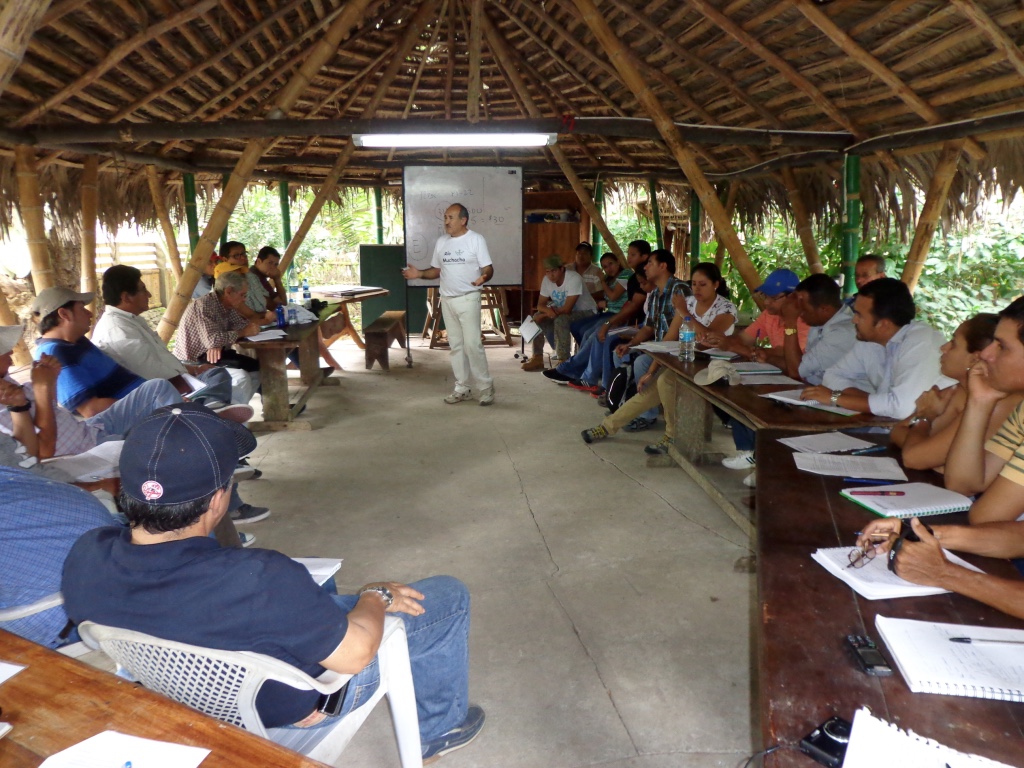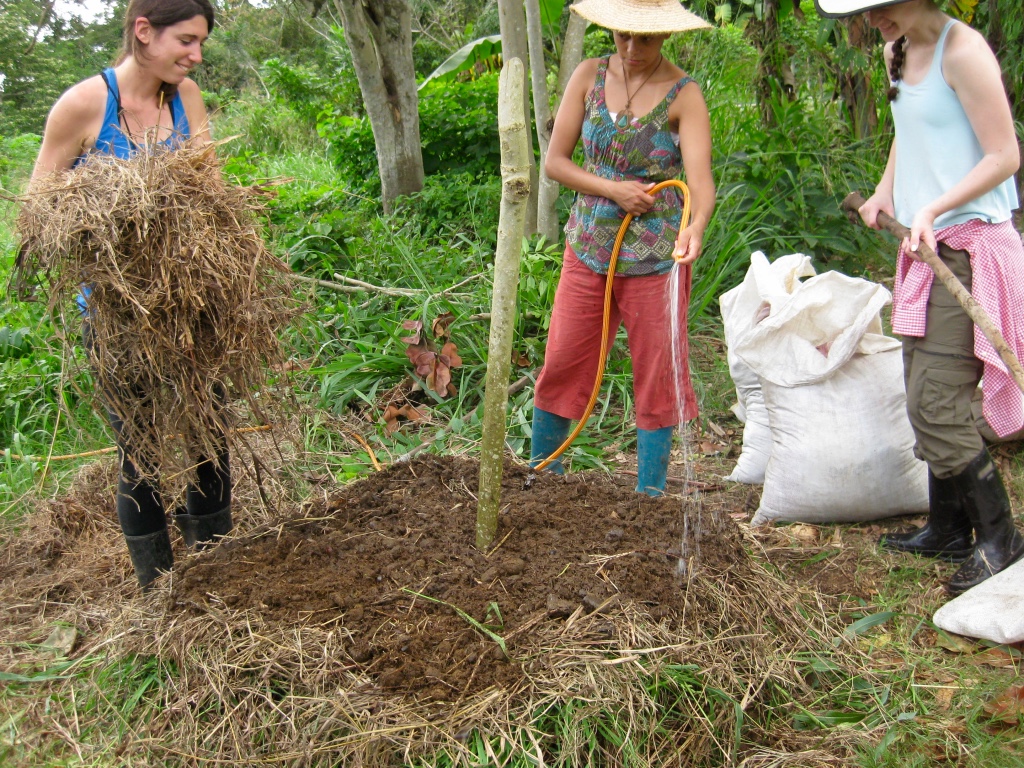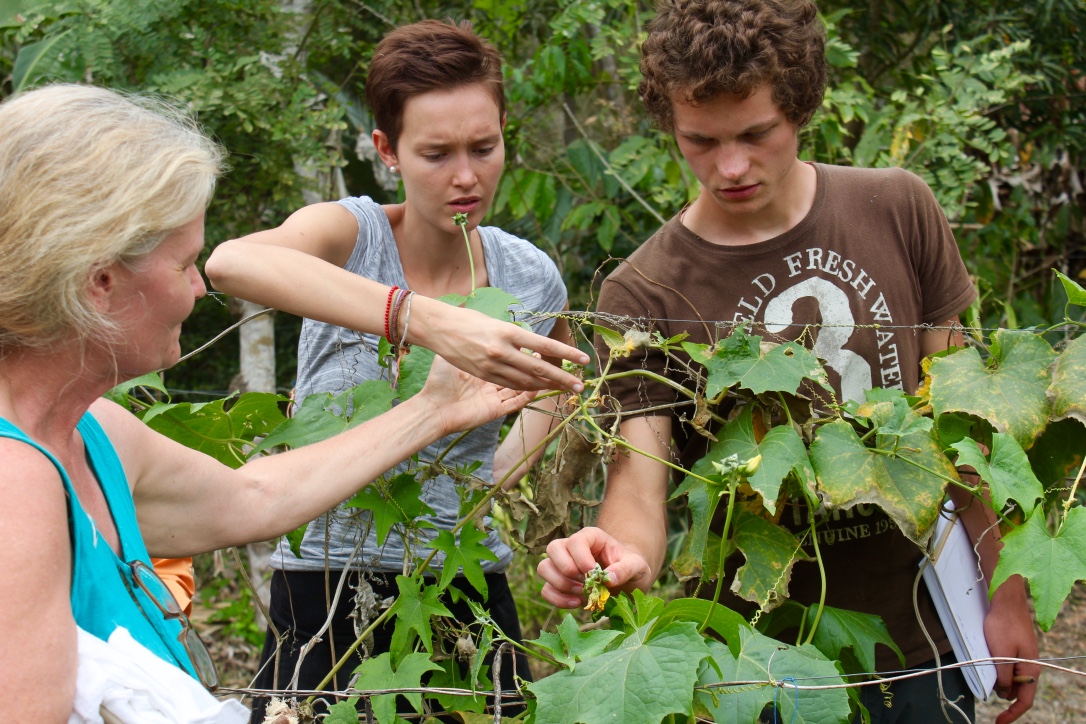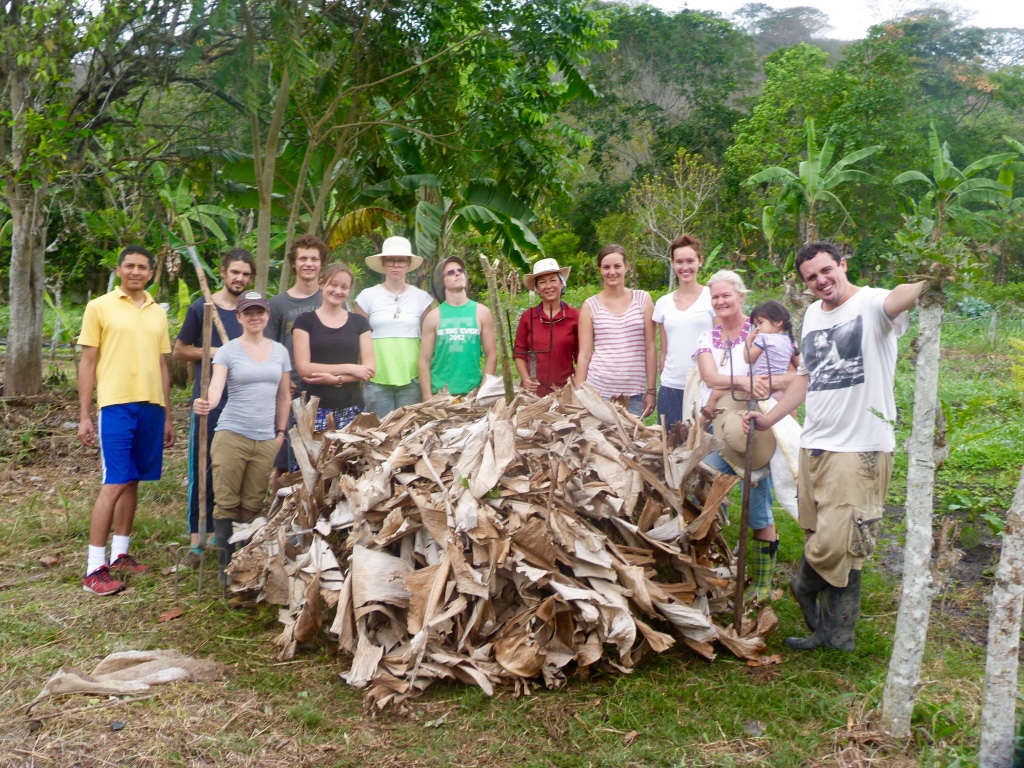….
Permaculture Design Course..Curso de Diseño en Permacultura
….
About The Course
Permaculture Design Certificate Course (PDC) Río Muchacho is a great opportunity to learn about practical sustainability, get the skills to regenerate our lives and the Earth, and have fun!
The material was originally developed by Bill Mollison and David Holmgren, co-founders of permaculture, to teach the ethics, principles and foundations of sustainable design. All PDC courses offered throughout the world must follow the same format (see course syllabus and PDC Outline) to assure that the integrity of the certification process is upheld.
The course uses the book “Permaculture, a Designers Manual” published by Tagari Press. Permaculture is a design system that attempts to emulate nature and covers a wide range of topics on:
ecological living | energy efficiency | intensified gardening | sustainable living skills | organic agriculture | water harvesting and uses | sun | food | land and soil | and generally living in harmony with the planet and the environment.
The idea of permaculture as ‘permanent agriculture’ is still evolving. With each new breakthrough in Appropriate Technology new skills and ideas are added. New technologies in solar energy, wind energy, human energy and water energy are added all the time under the umbrella of Permaculture.
New techniques in Natural Building such as earth bag building or super adobe, new technology in rammed earth, as well as older wattle and daub, and Adobe, all fall under the sustainable umbrella of Permaculture.
Permaculture is this flexibility to encompass all that makes it unique… and well… sustainable!
We look forward to Welcoming you to Río Muchacho
Course Dates
More info soon
Course Outline
1. INTRODUCTION
Human past, present and future
Permaculture design philosophy
Holistic and systemic thinking
Key problems
Ethics of Permaculture
Definitions of Permaculture
History of Permaculture
2. CONCEPTS & THEMES IN DESIGN
Ecology applied to permaculture design
Mollison’s and Holmgren’s Principles
3. METHODS OF DESIGN
Sectors
Zones
Elements
Functional analysis
Practices
4. PATTERNS
Patterns in nature
Traditional uses of patterns
Practical uses
5. CLIMATES
Climatic factors
Local knowledge
Broad climate Characteristics of major climates
6. TREES
Trees and their energy transactions
Types of forests and products
Food forests
7. WATER
Fresh water on earth
Water cycle
Erosion
Capturing and storing water
Sanitation
Irrigation
8. SOILS
Soil structure
Soil functions
Types of soil
Compost
Vermiculture
Rotations
Cover crops
Micro organisms
9. EARTHWORKS
Design
Implementation
Reading the land
Terraces
Contour
Swales
A frames
Garden beds
Pots for urban permaculture
10. CLIMATE DESIGN
Design strategies for different climates: housing and food production
11. AQUACULTURE
Chain of life in water systems
Systems for living ponds
12. STRATEGIES
Alternative Global Nation
Social permaculture
Governance
Economics
13. DESIGN EXERCISE
Description of Exercise – a comprehensive use of all elements of the course, students use and collaborate on design, elements, natural energies, sectors, winds, human energies, natural energies, land slope, soils, connections to natural systems
14. APPROPRIATE TECHNOLOGY
Solar energy, Pumps, panels, dryers, ovens
Electrics - bike, motors, light
Heating - Rocket stove, solar passive and active
Natural buildings - Adobe, Super Adobe, Rammed Earth, Wattle and Daub, Bamboo, Log cabin, RV, Tiny house
Permaculture Jobs and Careers
..
Contenido del curso
El Curso Certificado en Diseño de Permacultura (PDC) Río Muchacho es una gran oportunidad para aprender sobre sostenibilidad práctica, adquirir las habilidades para regenerar nuestras vidas y la Tierra, ¡y divertirnos!
El material fue desarrollado originalmente por Bill Mollison y David Holmgren, cofundadores de permacultura, para enseñar la ética, principios y fundamentos del diseño sustentable. Todos los cursos de PDC ofrecidos en todo el mundo deben seguir el mismo formato (consulte el programa del curso y el esquema de PDC) para garantizar que se mantenga la integridad del proceso de certificación.
El curso utiliza el libro "Permacultura, un manual de diseñadores" publicado por Tagari Press. La permacultura es un sistema de diseño que intenta emular la naturaleza y cubre una amplia gama de temas sobre:
vida ecológica | eficiencia energética | jardinería intensificada | habilidades para una vida sostenible | agricultura orgánica | captación y usos del agua | sol | comida | tierra y suelo | y en general vivir en armonía con el planeta y el medio ambiente.
La idea de permacultura como “agricultura permanente” todavía está evolucionando. Con cada nuevo avance en tecnología apropiada se agregan nuevas habilidades e ideas.
Nuevas tecnologías en energía solar, energía eólica, energía humana y energía hidráulica se agregan todo el tiempo bajo el paraguas de la Permacultura. Nuevas técnicas en Construcción Natural como la construcción con bolsas de tierra o súper adobe, nuevas tecnologías en tierra apisonada, así como la antigua acacia. and daub y Adobe, todos caen bajo el paraguas sostenible de la permacultura.
La permacultura es esa flexibilidad para abarcar todo lo que la hace única… y bueno… ¡sostenible!
Esperamos darle la bienvenida a Río Muchacho
Fechas del Curso
Teoría: 13/11/2023 – 24/11/2023
Prácticas: 27/11/2023 – 12/08/2023 (opcional)
más detalles a continuación
1. INTRODUCCIÓN
Pasado, presente y futuro de la humanidad
Filosofía de diseño de permacultura.
Pensamiento holístico y sistémico.
Problemas clave
Ética de la permacultura
Definiciones de permacultura
Historia de la permacultura
2.C CONCEPTOS Y TEMAS EN EL DISEÑO
Ecología aplicada al diseño de permacultura.
Principios de Mollison y Holmgren
3. MÉTODOS DE DISEÑO
Sectores
Zonas
Elementos
Análisis funcional
Prácticas
4. PATRONES
Patrones en la naturaleza
Usos tradicionales de los patrones
Usos prácticos
5. CLIMAS
Factores climáticos
Conocimiento local
Clima general
Características de los principales climas
6. ÁRBOLES
Los árboles y sus transacciones energéticas
Tipos de bosques y productos
Bosques alimentarios
7. AGUA
Agua dulce en la tierra
Ciclo del agua
Erosión
Captación y almacenamiento de agua
Saneamiento
Riego
8. SUELOS
Estructura del suelo
Funciones
Tipos de suelo
Compost
Lombricultura
Rotaciones
Cultivos de cobertura
Microorganismos
9. OBRAS DE LA TIERRA
Diseño
Implementación
leyendo la tierra
Gradas
Contorno
Gales del Sur
un marco
Camas de jardín
Macetas para perma urbana
10. DISEÑO CLIMÁTICO
Diseño de estrategias para diferentes climas: vivienda y producción de alimentos.
11. ACUICULTURA
Cadena de vida en sistemas acuáticos
Sistemas para estanques vivos
12. ESTRATEGIAS
Nación global alternativa
Permacultura social
Gobernanza
Economía
13. EJERCICIO DE DISEÑO
Descripción del ejercicio - un uso exhaustivo de todos los elementos del curso - los estudiantes utilizan y colaboran en el diseño, elementos, energías naturales, sectores, vientos, energías humanas, energías naturales - pendiente de la tierra - suelos - conexiones con los sistemas naturales
14. APPROPRIATE TECHNOLOGY
Energía solar, Bombas, paneles, secadores, hornos
Electricidad: bicicleta, motores, luz
Calefacción - Estufa cohete, solar pasiva y activa
Edificios naturales: Adobe, Super Adobe, tierra apisonada, Wattle and Daub, bambú, cabaña de troncos, casa rodante, casa pequeña
Empleos y carreras de permacultura
….
....
Your Teacher..Profesor
….
Javier Carrera
Permaculturalist, author, educator and activist, Javier is an expert in regenerative systems, with emphasis on food systems.
Founder and Social Coordinator of the Seed Guardians Network, he is also:
Editor of Allpa Magazine
Chief Editor Madre Semilla Educational Platform
Radio Semilla podcaster
Editor of Tarpuna video series
Research Director of the first Inventory of Food Heritage of Ecuador
Member of the Global Alliance for the Future of Food
President or The Wayruro Association of Solidarity Commerce
President of Grupo Allpa Foundation and
Leader of the Quito Chapter, Weston A. Price Foundation
..
Javier Carrera, Ecuatoriano
Permaculturalista, autor, educador y activista, Javier es experto en sistemas regenerativos, con énfasis en sistemas alimentarios.
Fundador y Coordinador Social de Seed Guardians Network, además es:
Editor de la Revista Allpa
Editor Jefe Plataforma Educativa Madre Semilla
Podcaster de Radio Semilla
Editor de la serie de vídeos Tarpuna.
Director de Investigación del primer Inventario del Patrimonio Alimentario del Ecuador
Miembro de la Alianza Global para el Futuro de los Alimentos
Presidente de la Asociación Wayruro de Comercio Solidario
Presidente de la Fundación Grupo Allpa y
Líder del Capítulo Quito, Fundación Weston A. Price
….
….Course location..Ubicación del curso….
Río Muchacho Organic Farm & Eco-Lodge
Manabí, Ecuador
Courses are held at the National Geographic endorsed Río Muchacho Organic Farm, on the west coast of Ecuador near Bahía de Caráquez Ecocity.
Lodging is in rustic but comfortable bamboo bungalows. All meals are family-style amongst volunteers and people who live on the farm.
The food is harvested daily from the farm, deliciously fresh vegetarian cuisine. Special dietary restrictions can be catered to.
Course review
Alex on Tripadvisor:
“This place is a paradise for many. Despite being considered a “rustic” alternative to tourism, there is a certain feeling of bliss in unplugging for your entire length of stay. Visitors are able to come for days or months. I personally spent two months there, dividing my time between volunteering, and attending the month-long permaculture course.
My experience living there has definitely changed me for the better. And, the course itself could not have gone better. It was so full of information and ideas, I am fully motivated returning home equipped to take charge of long-awaited projects in my home fields. From my experience working in the field, to my nights of tranquility, I learned a new way of existence. I realized how splendidly simple it is to live sustainably; and Rio Muchacho provides the perfect community in which to learn.
I met many visitors during my length of stay, and even those who stayed for a few days were all departing with previously unobtained knowledge. There is so much going on at the farm in terms of particular projects or methods of sustainable living, that one can become acquainted with much in a very little amount of time. There is plenty of work to be done, and the owners are very happy to help facilitate newcomers into the routines. Cheers to Nicola and Dario for their glowing energy that shines bright from Ecuador.
If one wishes to see excellent examples of eco-tourism, organic agriculture and agroecology, this is the place to visit. They sewed in me, many seeds of wisdom that I am taking to scatter the earth. I hope you get a chance to stop in and let them rub off on you too. Cheers”
Course dates again
Theory: 13/11/2023 – 24/11/2023
two weeks of theoretical principles
Practical: 27/11/2023 – 08/12/2023
(optional)
two weeks of practical application
In the practical component, you will get hands on experience with:
Worm farming, composting (urban and large scale), seed plant, transplanting, soil preparation, weeding, harvesting, swale making, working with bamboo, compost toilets, bread and cheese making, ferments, preparing farm to table meals, hügelkultur, seed saving, mulching, harvesting and preparing wild foods, animal feeding, compost tea, microorganisms, and collecting forage plants etc.
The weekends
Participants are welcome to spend weekends at the farm, or you can go to the beach and explore the surrounds. The closest beach town is Canoa where you can take surf classes, go horseback-riding on the beach, or just enjoy cocktails from a hammock beneath the coconut palms!
Who is the course for?
Everyone that eats! PDCs are worth their weight in gold and can be life changing for participants. It’s for those who are ready now to live a more simple, sustainable, meaningful life closer to nature, growing your own food - even if you have no land! The course is suitable for people who have no experience in agriculture, but is also challenging enough for those who have some prior experience. It is an opportunity to learn and practice new skills, experience a new culture, and learn some Spanish!
Do you need to know Spanish? Some Spanish is useful, but it is not a requirement. The course will be in English however, some of the second part practical work may be done with Spanish speakers. The farm can organize Spanish classes a week prior to the course, for you to get a bit more accustomed. If English is not your first language this is also an opportunity to improve!
Can I get University Credit for the program? The course is accepted in most universities as credit towards your studies. We are happy to fill out any evaluation forms that you might need, just let us know!
Before and after
Some people come to the farm before the course, from a week or even up to a month earlier. With this extra time, they get a better feel for the farm and sometimes take Spanish classes to reach a better level prior to the course commencing.
You are welcome to stay at the farm after the 4 weeks for more practical experience. If you are interested in traveling more before returning home, we can also help with travel information and reservations for the Amazon.
Optional visits
Canoa beach
Isla Corazon (mangrove Island with bird colonies)
La Segua wetland reserve
Bahia Archaeological Museum
Prices in USD
Permaculture Design Course (PDC) Theory only - $800
PDC Practical and Theory - $1300
EARLY BIRD - SAVE $200
Book the entire course
by Friday, 13 October 2023
and pay the Early Bird special rate of just $1100
note: we have a no refund policy
within four (4) weeks of the course
start date however, in case
of accident or emergency payments
can be transferred to another course
..
Granja Orgánica y Eco-Lodge Río Muchacho
Manabí, Ecuador
Los cursos se llevan a cabo en Río Muchacho Organic Farm, en la costa central del Ecuador, cerca de Bahía de Caráquez Ecociudad. El alojamiento es en cabañas de bambú y paja, rústicas pero cómodas.
Todas las comidas son de estilo familiar entre los voluntarios y las personas que viven en la finca. La comida es cosechada todos los días de la finca, cocina vegetariana deliciosamente fresca, en ocasiones con pescado o carne blanca.
Restricciones dietéticas especiales pueden normalmente ser atendidas, por favor ¡consúltenos!
Comentarios sobre el curso
Una reseña de Alex en Tripadvisor:
"Este lugar es un paraíso para muchos. A pesar de que se considera una alternativa "rústica" al turismo, hay una cierta sensación de dicha al “desenchufarse” durante toda su estadía. Los visitantes pueden venir por días o meses. - Personalmente pasé dos meses allí, dividiendo mi tiempo entre el voluntariado y el curso de permacultura de un mes. Mi experiencia viviendo allí definitivamente me ha cambiado para mejor. - Y el curso en sí no podría haber ido mejor. Estaba tan lleno de información e ideas; estoy totalmente motivado para regresar a casa y encargarme de proyectos largamente esperados en los campos de mi lugar de origen. - Desde mi experiencia trabajando en el campo, hasta mis noches de tranquilidad, aprendí una nueva forma de existencia. Me di cuenta de cuán espléndidamente simple es vivir de forma sostenible; y Rio Muchacho ofrece la comunidad perfecta para aprender.
Conocí a muchos visitantes durante mi estadía, e incluso aquellos que se quedaron por unos días partieron con nuevo conocimiento adquirido. Hay tantas cosas sucediendo en la granja en términos de proyectos particulares o métodos de vida sostenible, que uno puede familiarizarse con mucho en muy poco tiempo. Hay mucho trabajo por hacer, y los propietarios están listos para ayudar a facilitar el ingreso de los recién llegados a las rutinas. Felicitaciones a Nicola y Darío por su energía brillante que brilla desde el Ecuador.
Si uno desea ver excelentes ejemplos de ecoturismo, agricultura orgánica y agroecología, este es el lugar para visitar. Ellos sembraron en mí muchas semillas de sabiduría que estoy tomando para esparcir la tierra. Espero que tengan la oportunidad de parar y dejar que les pasen un poco de su sabiduría. Saludos."
Fechas del curso
Teoría: 13/11/2023 – 24/11/2023
dos semanas de principios teóricos
Prácticas: 27/11/2023 – 12/08/2023 (opcional)
dos semanas de aplicación práctica
En el componente práctico, obtendrá experiencia práctica con:
Cultivo de lombrices, compostaje (urbano y a gran escala), semillas de plantas, trasplantes, preparación del suelo, deshierbe, cosecha, elaboración de canales, trabajo con bambú, sanitarios de compost, elaboración de pan y queso, fermentos, preparación de comidas de la granja a la mesa, hügelkultur, ahorro de semillas. , acolchado, cosecha y preparación de alimentos silvestres, alimentación animal, té de abono, microorganismos y recolección de plantas forrajeras, etc.
Los fines de semana
Los participantes pueden pasar los fines de semana en la granja o ir a la playa y explorar los alrededores. La ciudad costera más cercana es Canoa, donde puedes tomar clases de surf, montar a caballo en la playa o simplemente disfrutar de cócteles en una hamaca bajo los cocoteros.
¿Para quién es el curso?
¡Todos los que comen! Los PDC valen su peso en oro y pueden cambiar la vida de los participantes. Es para aquellos que ahora están listos para vivir una vida más simple, sustentable y significativa, más cerca de la naturaleza, cultivando sus propios alimentos, ¡incluso si no tienen tierra! El curso es adecuado para personas que no tienen experiencia en agricultura, pero también es lo suficientemente desafiante para quienes tienen alguna experiencia previa. ¡Es una oportunidad para aprender y practicar nuevas habilidades, experimentar una nueva cultura y aprender algo de español!
¿Necesitas saber español? Algo de español es útil, pero no es un requisito. El curso será en inglés, sin embargo, algunos de los trabajos prácticos de la segunda parte se podrán realizar con hispanohablantes. La finca puede organizar clases de español una semana antes del curso, para que te acostumbres un poco más. Si el inglés no es tu primer idioma, ¡esta también es una oportunidad para mejorar!
¿Puedo obtener crédito universitario por el programa? El curso es aceptado en la mayoría de las universidades como crédito para tus estudios. Estaremos encantados de completar cualquier formulario de evaluación que pueda necesitar, ¡háganoslo saber!
Antes o después del curso
Algunas personas vienen a la finca antes del curso, desde una semana o incluso hasta un mes antes. Con este tiempo extra, conocen mejor la granja y en ocasiones toman clases de español para alcanzar un mejor nivel antes de que comience el curso.
Le invitamos a quedarse en la granja después de las 4 semanas para obtener más experiencia práctica. Si está interesado en viajar más antes de regresar a casa, también podemos ayudarlo con información de viaje y reservas para el Amazonas.
Visitas opcionales
Playa de canoa
Isla Corazón (Isla de manglares con colonias de aves)
Reserva Humedal La Segua
Museo Arqueológico de Bahía
Precios
Curso de Diseño de Permacultura (PDC) Solo teoría - $800
PDC Práctica y Teoría - $1300
RESERVA ANTICIPADA: AHORRE $200
Reserve el curso completo antes del
viernes 13 de octubre de 2023
y pague la tarifa especial por
reserva anticipada de solo $1100
Nota: tenemos una política de no reembolso
dentro de las cuatro (4) semanas
posteriores a la fecha de inicio del curso;
sin embargo, en caso de accidente o emergencia,
los pagos se pueden transferir a otro curso.
….
How to Register
To ensure your place in the course
1. Download the enrolment form
2. Complete and send it to: info@riomuchacho.com
or by WhatsApp on: +593 9 6228 5432
..
Cómo registrarse
Para asegurar tu plaza en el curso
1. Descarga el formulario de inscripción
2. Complétalo y envíalo a: info@riomuchacho.com
o por WhatsApp al: +593990089592
….










